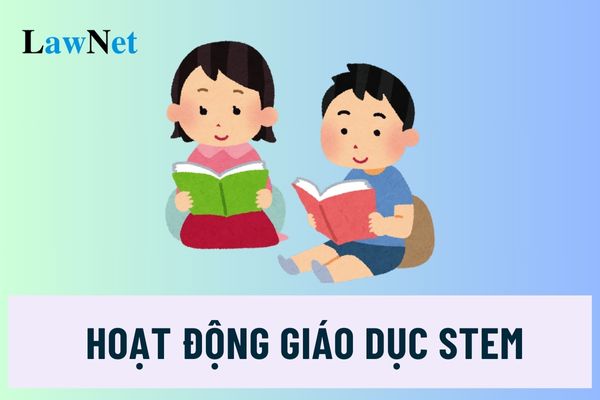What are guidelines for the organization of STEM education in primary education in Vietnam?
What is STEM Education?
In subsection 1 of Section 2 Official Dispatch 909/BGDDT-GDTH in 2023 as follows:
Content of STEM Education
STEM education is an educational method mainly based on integrated teaching, providing opportunities for students to mobilize and aggregate knowledge and skills in the fields of Science, Technology, Engineering, and Mathematics to develop qualities, capabilities, and effectively address practical life issues.
When implementing STEM education, it is encouraged to integrate additional elements of art and humanities (Art) in some subjects/educational activities in the curriculum to expand and improve the effectiveness of practical education, cooperation in various ways to promote creativity, aesthetics, curiosity, and empathy of students (implementing STEAM education)
STEM education is an abbreviation of:
- Science,
- Technology,
- Engineering,
- Mathematics.

Guidance on organizing STEM education activities in primary education in Vietnam (Image from the Internet)
What are the purposes and requirements for organizing STEM education activities in primary education?
In Section 1 Official Dispatch 909/BGDDT-GDTH in 2023, the purposes and requirements for organizing STEM education activities in primary education are clearly stated as follows:
- Enhance awareness among management staff and teachers about the position, role, and significance of STEM education in implementing the Primary School Education Program; unify the content, methods, and forms of organizing STEM education activities; foster and enhance the management, organizational capacity of STEM education activities for teachers in primary educational institutions.
- Effectively implement STEM education activities to support and strengthen education in Science, Technology, Engineering, Mathematics, Informatics, and Arts; create interest, stimulate a passion for learning, help students explore their potential, discover science and technology, promote creativity and apply solutions to real-life problems.
- Organize STEM education activities closely aligned with the objectives and expected outcomes of relevant subjects/educational activities, suitable to the psychological characteristics and cognitive development levels of students and the conditions of the school; promote integrated learning and teaching without creating pressure or overload for students and teachers.
What are guidelines for the organization of STEM education in primary education in Vietnam?
In subsection 2 of Section 2 Official Dispatch 909/BGDDT-GDTH in 2023 the forms of organizing STEM education in primary education are clearly stated as follows:
STEM Lessons
Teaching subjects through STEM lessons is an integrated or interdisciplinary teaching form. This is the main form of implementing STEM education in schools to effectively execute the Primary School Education Program.
The content and requirements of STEM lessons are closely aligned with the expected outcomes of the subjects/educational activities in the Primary School Education Program. The duration for organizing STEM lessons is scientifically, flexibly structured based on the related subjects/educational activities, suitable for the psychological age of students, without causing overload for students and teachers, and is reflected in the school's educational plan according to regulations.
The process of implementing STEM lessons is based on the engineering design process or the science discovery process with appropriate student activities and using primary school teaching equipment as stipulated by the Ministry of Education and Training, along with students' learning tools in subjects/educational activities, easily found and available materials for teachers and students. Encouraging the use of supplementary digital resources, virtual experiments, simulations, software that can be easily accessed and used inside and outside the classroom to help students proactively learn.
Assessment of students in STEM lessons is carried out according to the regulations on assessment and evaluation of the Primary School Education Program. Based on the requirements of STEM lessons, teachers assess students using primary methods such as observation, questioning, evaluation through learning portfolios, students' products and activities. Special attention should be paid to process assessment (continuous assessment) to encourage students' progress, create confidence, and interest in learning.
STEM Experiential Activities
STEM experiential activities are organized through STEM clubs, STEM days, STEM learning projects, or STEM experiential activities in real-life locations suitable to the goals, interests, talents, and aspirations of students to create interest and motivation for learning, contribute to the development of capabilities, qualities, and nurture passion and talent in students. STEM experiential activities are built into the school's educational plan in line with the conditions of the educational institution and the realities of the locality.
STEM experiential activities are designed based on integrated interdisciplinary teaching, addressing various fields that require students to aggregate knowledge and skills to propose solutions to solve real-life problems effectively, flexibly, and creatively.
The space and time for organizing STEM experiential activities can extend beyond the school environment (production facilities, universities, research institutes, etc.), outside the time allotted for subjects/educational activities.
Getting Acquainted with Scientific Research and Engineering
Getting acquainted with scientific research and engineering is an organized form of STEM education activities for students with talents, interests, and curiosity in exploring and initially approaching scientific and engineering research to solve practical problems.
Through the process of teaching STEM lessons and STEM experiential activities, teachers identify talented students to foster and create favorable conditions for them to get acquainted with scientific and engineering research.
Educational institutions organize STEM education activities to provide students with opportunities to get acquainted with research through individual or group research projects with the guidance of one or a group of teachers or in cooperation with other social forces related to the research content (such as families, production facilities, universities, research institutes, science centers, experts, artisans, scientists, etc.).
Based on practical conditions, educational institutions can organize STEM experiential activities, scientific and engineering research exchange days at the unit level as a basis to select research projects to participate in scientific and engineering research playgrounds suitable for primary school students.

